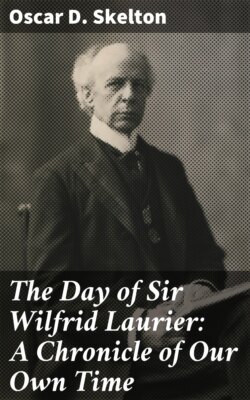Читать книгу The Day of Sir Wilfrid Laurier: A Chronicle of Our Own Time - Oscar D. Skelton - Страница 9
На сайте Литреса книга снята с продажи.
FIRST YEARS IN PARLIAMENT
ОглавлениеIn the Provincial Legislature—In federal politics—The Mackenzie government—The Riel question—Protection or free trade—The Catholic programme—Catholic liberalism—The clergy in politics—Political liberalism—In the administration
Less than five years had passed after Wilfrid Laurier came to Arthabaskaville, a boyish, unknown lawyer-editor, when he was chosen by an overwhelming majority as member for Drummond-Arthabaska in the provincial legislature. His firmly based Liberalism, his power as a speaker, his widespread popularity, had very early marked him out as the logical candidate of his party. On many grounds he was prepared to listen to the urging of his friends. His interest in politics was only second, if second it was, to his interest in his profession. The ambition to hold a place in parliament was one which appealed to practically every able young lawyer of his time in Quebec, and, thanks to the short sessions of the provincial assembly and the nearness of Arthabaska to Quebec, membership in the legislature would not greatly interfere with his work at home. Yet his health was still precarious, and it was with much hesitation and reluctance that he finally consented to stand for the county in 1871, at the second general election since Confederation. Though ill throughout the campaign, he was able to make a few speeches, and the loyal support of his friends did the rest. His opponent, Edward Hemming, a barrister of Drummondville, had been the previous member for the riding. At the close of the polls—those were still the days of open voting—it was found that, while the Liberal party in the province was once more badly defeated, Wilfrid Laurier had won his seat by over one thousand majority.
When the legislature met at Quebec in November, there was a lively interest on both sides of the chamber in the young man of thirty who had scored such a notable victory. At that time the legislature had an unusually large number of men of first rank in eloquence and parliamentary ability, including Cartier, Chapleau, Cauchon, Holton, and Irvine. All these except Chapleau were also members of the House of Commons, since at that time no law forbade dual representation, and the standards were relatively high. The Government under Chauveau, the prime minister, was too firmly entrenched to be shaken by any assaults from the Opposition leader, Henri Joly de Lotbinière, and his scanty following. In the criticism, however, the member for Arthabaska took a notable part. He did not speak often, but when he did his remarks were fresh and constructive. In the debate on the Address he scored the Government for its backward educational policy, urged active steps to check the exodus of French Canadians to the mills of New England, praised the ideals of British Liberalism, and called for a truce in racial and religious quarrels. In a later speech he presented the keenest constitutional criticism yet made of the system of dual representation, showing that it tended to bring the provinces too completely within the orbit of the central power and confuse local with federal issues. Three years later, it may be noted, the system was abolished.
The vigour and yet moderation of these first efforts, so aptly phrased and so admirably fitted to the peculiar requirements of parliamentary speaking, the grace and flair of the orator, gave the member for Arthabaska at a stroke high rank in the party. He was very soon urged to seek the wider opportunities of federal politics. Ottawa, it was clear, would make much greater demands upon his time than Quebec, yet his health was now improving. Accordingly he determined to make the change, and in the general federal elections of 1874 he was returned for Drummond-Arthabaska by a majority of two hundred and thirty-eight.
In 1874 the Liberal Government at Ottawa, under Alexander Mackenzie, seemed assured of a long term of office. It had been given an overwhelming majority in the election just concluded; its leaders were able and aggressive; and the Opposition was still crushed by the indignation which followed on the exposure of the Pacific Scandal.
Yet there were many weaknesses in its situation, which time was to make clear. The Government's forces were not closely united: the only bond holding together several of the groups which made up the majority was that of common opposition to the late administration. Many stragglers on the flanks were waylaid and brought back into their old camp by that arch-strategist, Sir John Macdonald. The question of leadership was not fully determined. In Ontario Edward Blake divided allegiance with Alexander Mackenzie, and Blake's inability to make up his mind definitely to serve under Mackenzie greatly weakened the party. In Quebec the situation was even more serious. Dorion was the man whose constructive ability, admirable temper, and long years of fighting against heavy odds marked him out as chief, but family and health considerations determined him to retire to the quieter if not less heavy labours of the bench. Fournier soon followed. Laflamme, in whose office Laurier had studied, was hardly a man of sufficient weight. Holton, leader of the small group of English Liberals in Quebec, was also in very poor health. To fill the gap Mackenzie summoned Joseph Cauchon, a former Conservative who had left his party on the Pacific Scandal; a man of great ability, active in the campaign for Confederation, but weakened by an unfortunate record of corruption in earlier days, a record which his Liberal opponents of those days had painted in startling and unforgettable colours.
